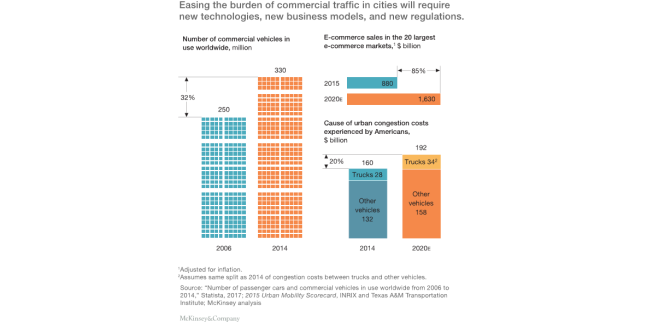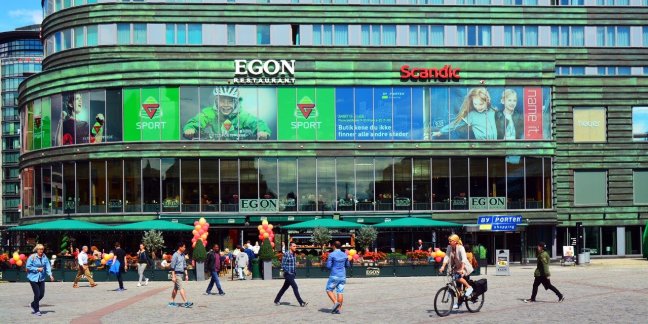Smart Shipping
I am currently a commuter and there is nothing I hate more than being stuck behind a line of semi-trucks trying to get on the entrance ramp for I55. There is hope since there are various ways for commercial transport to change to reduce congestion and carbon emissions. Bouton et al., points out that strategies such as urban consolidation centers, which can reduce delivery related mileage by 45%, or load pooling, which can reduce emissions by 30%. AriZona takes advantage of night deliveries to keep prices down, which is why most of their beverages are only 99 cents. By shipping at night, AriZona reduces congestion and is able to make faster shipments since there is little traffic. Below, you can see why easing congestion has economic benefits along with reduced carbon emissions.

Other companies such as Bigelow Tea have implemented a “No Idle” policy and implemented consolidated routes. This means that while a truck is at a facility, it must be turned off to reduce emissions. Additionally, by consolidating routes, they are able to cut 50,000 miles from trips which also reduces congestion. Soon, more companies may take implement these policies into their own distributions.
Now You’re Just an Uber I Used to Know
European taxi companies have despised Uber for the past several years. However, in the past few months, this disdain has resulted in new orders and a shaky future for Uber in Europe. Uber is facing various problems in the UK. In November, Uber lost a year-long appeal about the rights of drivers, they may have to start giving drivers a minimum wage and vacation days. Additionally, the Transport for London’s decided to not renew Uber’s license for operation meaning that Uber has to leave London. However, Phil Haigh reports that Uber is appealing the decision and is legally allowed to operate until a decision is made. In December, the Court of Justices of the European Union ruled that Uber is to be considered a transportation agency. This means that each country can create regulations for Uber drivers: licenses, fare meters, driver exams, strict background checks and more. This has major implications for the future of Uber in Europe, Henley reports that Uber left Denmark over fare meter requirements. If Uber were to leave Europe, this would make taxis the sole proprietor of on-demand driving services. Uber was a cheap alternative so this has implications for the poor in these cities.
Bye Bye Bye
In many areas of the world, there is an increasing desire for communities to disassociate themselves from cars. This trend is mostly focused in Europe but cities in other continents are also pushing for a decrease of vehicles in city centers and an increase in pedestrian zones, to reduce congestion and pollution. The idea is that driving will become more burdensome with the closing of streets while public transport is further developed. In 2019, Oslos will commence a total car ban, Chengdu, China was designed so that it only takes 15 minutes to walk anywhere, and streets in NYC are being turned to sidewalks. Garfield reports that Paris banned half of the cars for a single day and pollution dropped by 30%.

Image: Oslo.George Rex / Flickr
Other areas such as London have attempted to reduce congestion in city centers by charging fees while places like Mexico have implemented a rotating system of who is allowed to drive in the city. These efforts are all done to reduce carbon emissions. Sastre et al., reports that car free areas are actually beneficial to the local economy as people generally spend more money at nearby stores and real estate prices rise.
Sources
http://metro.co.uk/2017/12/19/current-situation-uber-london-taxi-app-wont-stopped-time-soon-7171771/
http://www.carfree.com/intro_cfc.html
http://www.businessinsider.com/oslo-bans-cars-from-its-city-center-2015-10
“Economic Impact of Pedestrianisation in Historic Urban Centre, the Valdemoro Case – Study (Spain)”☆ JuliánSastreaAnaSastrebAna MariaGamocTomásGaztelud

Hello,
First, I learned so much new information about current mobility issues throughout the world from reading your blog post. I wanted to compliment you on the applicability of your topics, effective writing style, and informative tone.
In addition, the topics you chose were very interesting. I even wish the requirements were a little longer than only 600 words so I could have learned more. Specifically about the issues concerning the potential disappearance of Uber in Europe. This is very surprising to me. Especially because they seem to be the world’s leaders in sustainable change, adaptation, and mitigation.
Do you truly believe Uber will be eliminated from European countries? Why or why not?
It is still just so surprising to me that the EU would consider eliminating a service that is so progressive, more sustainable than personal car ownership, and a very convenient service.
Thanks for the information! Great job!
LikeLike
I think Uber would leave EU countries that decide to implement requirements on Uber Drivers. Considering most of the marketing of Uber is that it is cheap and very flexible in combination with pretty relaxed hiring and work policy, these regulations may increase prices on consumers and make it harder to find drivers. I mean, there have been multiple times my friends and I have shoved four people into the backseat of an Uber and seat sensors would not allow for that.
However, this topic is something to be considered with mobility trends as a whole. I mean, if a country decides to go carless, Uber would be obsolete.
LikeLike
First of all, kudos to you for driving to school everyday. But, more importantly, I thought it was great that you brought in examples of solutions that have been implemented internationally. Sustainability is not only a “Chicago” issue. It’s not even an “USA” issue. It’s an international issue that we all to help contribute and fight for! It’ll be interesting to see how the new implementations in Oslo, Chendu, Paris, NYC, London, and parts of Mexico will benefit the environment. Hopefully this trend will leave a positive impact and encourage other cities to do the same. Why can’t we borrow ideas that are working and adjust them accordingly to fit our own city? I’m excited to see how your project will relate!
LikeLike
Thanks, the commute isn’t that bad since I only have class Tuesday and Thursdays and I don’t have to travel during rush hours.
I do love borrowing ideas and projects from other cities. However, we must remember societies are very different and that certain ideas will not work within a certain society. This presents a lot of issues within plan creation and implementation. I mean, even with NYC creating car-free zones, it would be hard to imagine Chicago implementing such decisions.
LikeLike
I’ve been interested in how the ride-sharing is going to change. in this site https://www.ridester.com/ridesharing-industry-future/ there is praise for ride-sharing as another way of mass transit, especially with autonomous cars. However, I read a comment left by a former cab driver. His concerns was having to work 50-60 hours a week (he is not alone https://www.usatoday.com/story/money/cars/2017/07/10/some-uber-drivers-work-dangerously-long-shifts/103090682/ ) to make what he used to make as a cab driver. Why? Because there is no set pricing and no regulations are held accountable. Essentially, the people want cheaper fares, but this requires drivers to work twice or three times as hard. If autonomous vehicles are really the future, what is to happen to the drivers left behind? Could all jobs be replaceable by robots and or computer algorithm? There needs to be some serious infrastructure in place to prevent thousands and or millions of jobs around the world. Will customers have the choice between a human and or autonomous driver, just as you can select specific vehicles? They say don’t quit your day job, but what if you have to drive 12+ hours a day to make decent money?
Something else to look into: https://www.bankrate.com/finance/jobs-careers/becoming-rideshare-driver-1.aspx#slide=1
LikeLike
Hey!
So I read the articles and they’re great sources of info on the subject matter.
To talk about pricing and regulations: I am not a market analyst, business guy, or economics person, however, I think a massive problem for the pricing is simple supply and demand. I mean, it all depends on the systems set in place. I can’t really speak about the ride sharing experience in Albuquerque because I have never visited so I have no idea why it would be about $5 an hour. However, things such as how do people commute to work, distance from work, students at nearby universities, amenities and services, public transit, cost of living, gas prices, and more all go into the supply and demand of ride sharing services. I mean, I wouldn’t expect an Uber driver to make much money in a place where everything is a fifteen minute walk.
Additionally, it said that earnings remained stable after fare dropping. So according to Uber’s data, even though people are paying less, drivers are for the most part making the same. I don’t have the data so I can’t exactly say that is true or how they came up with that conclusion.
To go along with that, I also know some people work for both Uber and Lyft and drive for them at the same time. I wonder what their earnings are like in comparison to people who drive only one.
Concerning job loss: I don’t know how to phrase this without sounding too inhumane and pessimistic, but I’d have to say these people will be left behind. Some people just don’t realize when an industry is dying and don’t attempt to get out. This is also fueled by people who try to revamp this industry even though it’s in its final stages. (See Trump trying to promote fossil fuels and so coal miners are not taking advantages of job training opportunities to be successful in a new industry.) Additionally, there are just some jobs that people do not care if they become automated. You don’t see the outcry because cashiers are losing their jobs due to self-checkouts or that farms don’t need as many workers because the machines are able to harvest and separate ripe and unripe produce simultaneously. Our society does not care about service employees. Additionally, I feel like many people will feel that drivers do not have a special skill set and thus shouldn’t be given job training. This is all very dependent on the market and societal mindsets.
LikeLike
First, I love the section titles! Second, one thing that stuck out to me in this article is the bigger role the private sector is starting to play in reducing carbon emissions. Moreover, some of these are ingenious and do not involve investing in a new technology or infrastructure. I think ideas like truck deliveries at night and “no idling” rule are perfect examples of how businesses can easily reduce their carbon footprint just by changing their behavior. As you said, hopefully other businesses follow.
LikeLike